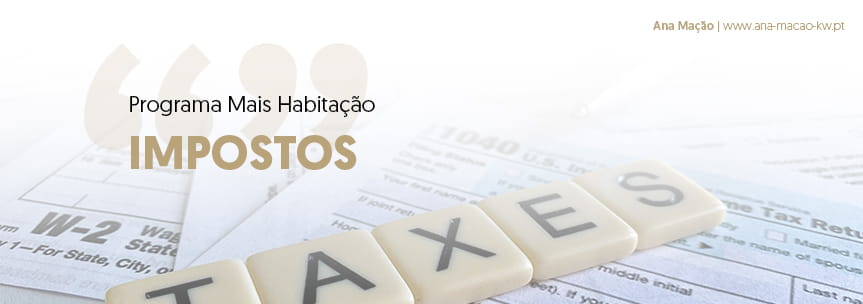The program aims to increase the supply of affordable housing in Portugal, fight real estate speculation and promote foreign investment in the housing sector.
Measures of the "Mais Habitação" Package
The program contains several measures, among which the following can be highlighted:
- Creation of support for the promotion of affordable rental housing;
- Promotion of a new generation of cooperativism for the promotion of affordable housing;
- Definition of exceptional and transitional rules regarding the value of rents in new lease contracts, relating to contracts concluded in the last five years;
- Protection of tenants with leases prior to 1990 and the guarantee of fair compensation from the landlord;
- Integration of the processing of the special eviction procedure and the leasing injunction with the Tenant and Landlord Desk (BAS), with a view to simplifying and improving its operation and strengthening the guarantees of the parties;
- Approval of various fiscal measures to promote and support leasing;
- Incentive to transfer apartments from local accommodation to housing rentals;
- creation of aextraordinary contribution on apartments and accommodation establishments integrated in an autonomous fraction of building in local accommodation;
- Revocation of residence permits for real estate investment activity;
- Expansion of the scope of exemptions from prior inspection by the Court of Auditors.
This legislative package consists of an extensive set of measures that can be separated into four main areas: lease, local accommodation, taxes and golden visas, namely:
lease

The program includes measures to make renting more affordable, such as:
- Limitations on rising rents for new contracts. The rents of houses, which are already on the market in the last five years, cannot suffer an annual increase above 2% in relation to the previous year. To this value, it is possible to add the readjustment coefficients of the three previous years, if they have not already been considered, corresponding to 5.43% for 2023. This measure only applies to contracts whose rents are lower than those defined in the affordable lease regime .
- Reduction from 28% to 25% of the special IRS rate on rents. This measure only applies in cases where the taxpayer does not opt for income aggregation. This tax benefit can be even greater if it is a long-term lease. For example, in the longer term, for contracts with a duration of more than 20 years, an IRS rate of only 5% applies (the previous value was 10%).However, this reduction in the IRS rate does not apply to lease agreements entered into after January 1, 2024, or when the rent exceeds by 50% the general rent price limits by type depending on the municipality where the property is located. In addition, there is no longer any IRS reduction for contracts whose duration is between two and five years.
- Forced lease of vacant houses. If the Municipality of the property zone considers the house to be vacant and if it is not located in the interior of the country, the owners will have 90 days to respond after being notified to carry out works or make use of the fraction. If there is no response from the owner within the defined period, the municipality may proceed with the forced leasing of the property. It is also foreseen that the city council may, ex officio or at the request of any interested party, determine the supervision of the conditions of use of the property.
- State pays rent arrears after three months of default. Thus, it will be up to the State to analyze the condition of the lessee and, if necessary, proceed with the recovery of amounts due through the methods already in force for the collection of other debts. When non-payment results from financial insufficiency, the situation is coordinated with Social Security.
- Tax benefits for affordable lease house works.
- Tenants can report the lease to the Tax Authority. Tenants will be able to notify the tax authorities of their lease agreements if the landlord fails to do so. This measure covers leasing, subleasing, promised agreements and their modifications or terminations. The conditions and deadlines for this will be defined by an ordinance of the Ministry of Finance.
- Exemption from capital gains on the sale of real estate to pay off a loan.This measure states that there will be no taxation on profits obtained from the sale of a family property, provided that the amount collected is used to settle the loan for the owner's main residence or his heirs. This tax benefit only applies to real estate transactions carried out between January 1, 2022 and December 31, 2024.
- Lease to sublease. In order to increase the offer in the leasing sector, this measure aims to rent private properties that are vacant to subsequently sublease them. The rent paid to the owner will have tax advantages, as long as the contract covers a minimum period of 5 years and the rent value is in line with the values and characteristics stipulated in the Affordable Lease Support Program (PAA).
- Creation of the Tenant and Landlord Desk (BAS). BAS will be responsible for ensuring the processing of the special eviction procedure and the leasing injunction.The eviction request is presented to the BAS, which notifies the tenant, who has 15 days to oppose or request a delay in vacating the property, in accordance with the law. The new law also makes several changes to this eviction process in case of non-payment of rents.
Local accommodation

The program includes measures to regulate local accommodation, such as:
- Extraordinary contribution on the AL. The activity of Local Accommodation (AL) will from now on be subject to an extraordinary contribution (CEAL). This contribution will be calculated based on an economic coefficient that takes into account the size of the property and its income, as well as urban pressure. A 15% tax is levied on this amount, which is not deductible in the calculation of profit for IRC purposes. Residential properties that are not autonomous fractions or spaces with independent use will be excluded from CEAL. The same applies to ALs that operate as the owner's own and permanent residence, provided they are not operated for more than 120 days annually. This fee will not be applied to properties located in the interior regions of Portugal.
- Expiration and review of local accommodation records. Holders of inactive AL registrations must provide proof of continued activity, within two months of the entry into force of the new law.In case of non-compliance, registrations will be cancelled, by decision of the mayor of the territorially competent municipal council. On the other hand, local accommodation units in permanent housing whose operation does not exceed 120 days a year will not be subject to the expiry of registration. The new rules also establish that local accommodation records will be reviewed during the year 2030 and, from the first review, renewable for five years. The only exception is local accommodation establishments that constitute a real guarantee of loan agreements that have not yet been fully settled on December 31, 2029.
- Owners can oppose new AL. For the attribution of new AL Licenses, in the event that the property is part of a building intended for housing, the owners must be consulted in advance, with unanimous approval being mandatory. On the other hand, it is stipulated that "the constitutive title of the horizontal property can be modified by public deed, with the agreement of all the owners".
- Suspension of new AL licenses. The attribution of new licenses for local accommodation, in areas outside the national interior, will no longer be possible. This suspension does not affect properties that are part of the Revive Natureza Fund, nor the autonomous regions. This suspension also applies to the whole or only part of a municipality, if a situation of housing shortage is recognized.
- Incentive to move AL homes to long-term rentals. Owners who transfer their dwellings from the local accommodation regime to permanent lease, until December 31, 2024, will benefit from IRS or IRC exemption on the amounts collected from rent until the end of 2029, without any restriction as to the amount of the rent to be stipulated. However, to be eligible for this benefit, properties must have been registered as local accommodation by December 31, 2022 and the lease contract must be formalized by the end of 2024.
Taxes

The program includes measures to reduce housing taxes, such as:
- Family IMI deduction increases. The value of the IMI discount that municipalities are authorized to grant to their residents, depending on the number of dependents (2, 3 or more), will increase.
- Tax benefits to urban rehabilitation end up for Investment Funds . The IRC exemption for income generated by Investment Funds (created between 2008 and 2013), with properties that have been the subject of urban rehabilitation, was annulled, as was the tax benefit for holders of shares in these funds. However, a decrease in the tax burden is anticipated for real estate investment funds and for real estate investment companies, if "at least 75% of their assets consist of properties intended for residential leasing at controlled prices".
- Tax benefits for affordable lease house works.With the aim of increasing the number of homes included in the Affordable Leasing Program (PAA), a reduced VAT rate of 6% is planned for building or renovating properties intended primarily for this program. Additionally, there will be exemption from IMI for three years, extendable for another five years, and exemption from IMT on purchases intended for rehabilitation.
Golden Visas

The program includes measures to attract foreign investment to the housing sector, such as:
- End of Golden Visas. With the implementation of this legislative package, new applications for residence visas based on investment activities will no longer be accepted, without, however, jeopardizing the renewal of previously granted permissions. This restriction does not apply in the case of family reunifications. Requests to obtain or renew residence permits that are “awaiting prior assessments by the Municipal Councils”, at the date of implementation of the law, continue to be valid.
- Land or buildings made available to housing cooperatives. The Mais Habitação Package foresees the provision to housing cooperatives of land or public buildings for construction, or conversion into affordable rental houses.
- Simplification of licensing.
- 250 million for affordable housing. The program foresees the approval of a line of credit, with mutual guarantee and interest rate subsidy, for affordable housing projects, namely construction or rehabilitation and for the acquisition of the property, having to be placed on the rental market. The houses benefiting from this support must be allocated to affordable lease for at least 25 years, after which the municipalities and the IHRU have preemptive rights in acquiring them. Entities that can compete for this measure are cooperatives, commercial civil construction societies, municipalities and charities or other institutions of social solidarity.
- Line of 150 million for municipalities to carry out coercive works.This line of financing will be managed by Banco Português de Fomento, allowing municipalities to carry out coercive interventions.
Predictable Effects of the Mais Habitação Program
The Mais Habitação program is expected to have a positive impact on the housing market in Portugal. The program should help to increase the supply of affordable housing, reduce rent prices and promote foreign investment in the housing sector.
However, the Mais Habitação program has also been criticized by some sectors of society. Some critics argue that the program is not ambitious enough and will not solve Portugal's lack of affordable housing. Other critics argue that the program will benefit foreign investors over Portuguese ones.
The Mais Habitação program is currently in force and it is still too early to assess its real impact on the housing market. However, the program is an important measure to make housing more affordable in Portugal.
Here are some specific examples of how the Mais Habitação program can have a positive impact on the housing market in Portugal:
- Raising the rent threshold that can be charged by landlords can help lower the rent price for tenants.
- Creating a support fund for tenants who are struggling to pay their rent can help protect tenants from being evicted because they are unable to pay their rent.
- Facilitating access to social housing can help provide affordable housing to families in need.
- Strengthening enforcement of tenancy conditions can help protect tenants from falling victim to abusive practices by landlords.
- Limiting the number of local accommodation units that can be registered in each municipality can help reduce pressure on the rental market.
- Increasing local accommodation taxation can help to reduce the profit of real estate investors operating in the local accommodation sector.
- Creating a register of local accommodation units can help combat speculation in the local accommodation sector.
- Creating a new type of residence visa for foreign investors buying real estate in Portugal can help attract foreign investment to the housing sector.
- Increasing the minimum investment amount required to obtain a gold visa can help reduce the risk of speculation in the housing sector.
- Simplifying the process of obtaining a golden visa can help attract more foreign investors to the housing sector.
The Mais Habitação program is an important measure to make housing more affordable in Portugal. The program has the potential to contribute to increasing the supply of affordable housing, reducing rent prices and promoting foreign investment in the housing sector. However, it is still too early to assess the real impact of the program on the housing market.
Conclusion
Despite the goodness of some measures, the sector's general opinion is that this program is not very ambitious and that, given the size of the problem, buying or renting a house will continue to be a challenge for the majority of Portuguese people. On the other hand, there are those who think that some of these measures will have a negative impact on the supply side, namely with regard to the rental sector. Only time will tell, but the success of the Mais Habitação Package
Architectural projects will now be authorized only through the designer's term of responsibility, and public entities, namely municipalities, will be subject to penalties in situations of delay in issuing opinions.


